Yuhan Sun
LiveThinking: Enabling Real-Time Efficient Reasoning for AI-Powered Livestreaming via Reinforcement Learning
Oct 09, 2025
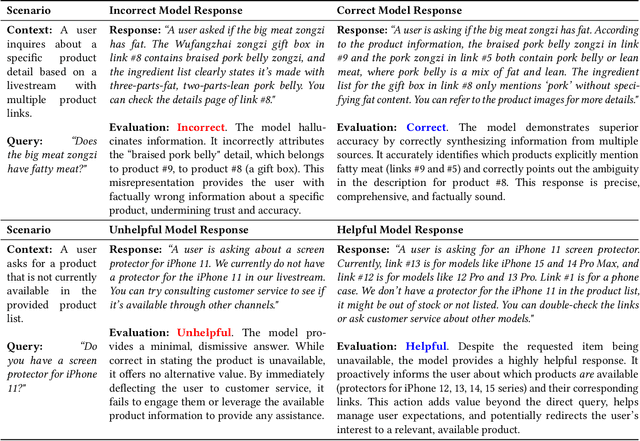
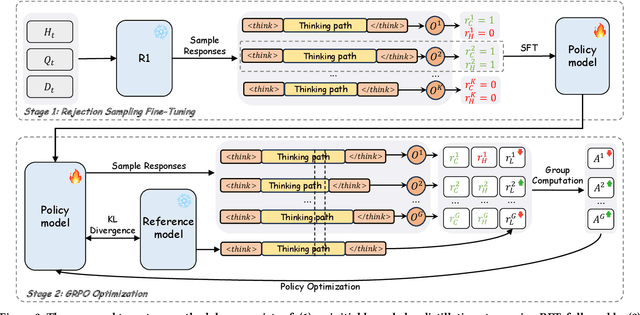
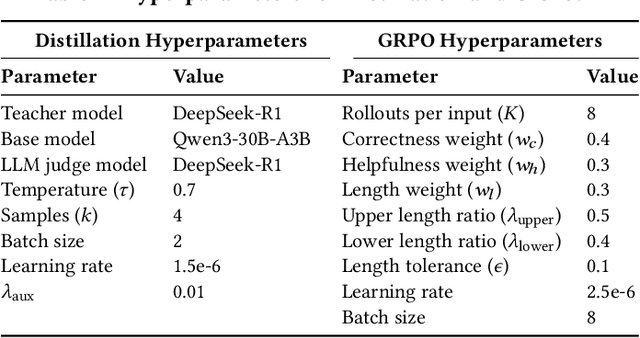
Abstract:In AI-powered e-commerce livestreaming, digital avatars require real-time responses to drive engagement, a task for which high-latency Large Reasoning Models (LRMs) are ill-suited. We introduce LiveThinking, a practical two-stage optimization framework to bridge this gap. First, we address computational cost by distilling a 670B teacher LRM into a lightweight 30B Mixture-of-Experts (MoE) model (3B active) using Rejection Sampling Fine-Tuning (RFT). This reduces deployment overhead but preserves the teacher's verbose reasoning, causing latency. To solve this, our second stage employs reinforcement learning with Group Relative Policy Optimization (GRPO) to compress the model's reasoning path, guided by a multi-objective reward function balancing correctness, helpfulness, and brevity. LiveThinking achieves a 30-fold reduction in computational cost, enabling sub-second latency. In real-world application on Taobao Live, it improved response correctness by 3.3% and helpfulness by 21.8%. Tested by hundreds of thousands of viewers, our system led to a statistically significant increase in Gross Merchandise Volume (GMV), demonstrating its effectiveness in enhancing user experience and commercial performance in live, interactive settings.
Technical Report of TeleChat2, TeleChat2.5 and T1
Jul 24, 2025
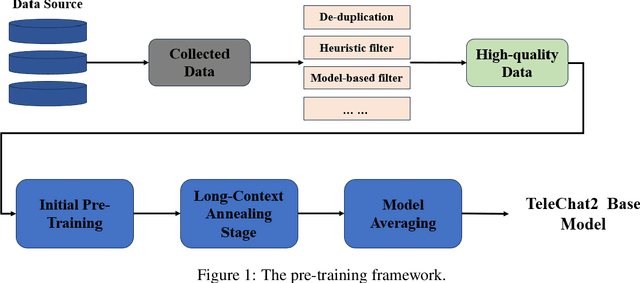
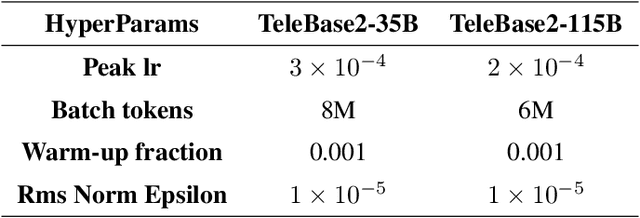
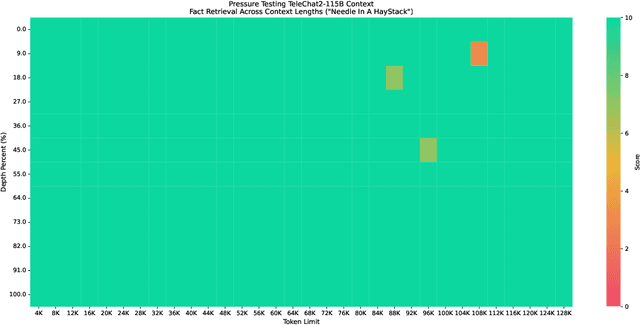
Abstract:We introduce the latest series of TeleChat models: \textbf{TeleChat2}, \textbf{TeleChat2.5}, and \textbf{T1}, offering a significant upgrade over their predecessor, TeleChat. Despite minimal changes to the model architecture, the new series achieves substantial performance gains through enhanced training strategies in both pre-training and post-training stages. The series begins with \textbf{TeleChat2}, which undergoes pretraining on 10 trillion high-quality and diverse tokens. This is followed by Supervised Fine-Tuning (SFT) and Direct Preference Optimization (DPO) to further enhance its capabilities. \textbf{TeleChat2.5} and \textbf{T1} expand the pipeline by incorporating a continual pretraining phase with domain-specific datasets, combined with reinforcement learning (RL) to improve performance in code generation and mathematical reasoning tasks. The \textbf{T1} variant is designed for complex reasoning, supporting long Chain-of-Thought (CoT) reasoning and demonstrating substantial improvements in mathematics and coding. In contrast, \textbf{TeleChat2.5} prioritizes speed, delivering rapid inference. Both flagship models of \textbf{T1} and \textbf{TeleChat2.5} are dense Transformer-based architectures with 115B parameters, showcasing significant advancements in reasoning and general task performance compared to the original TeleChat. Notably, \textbf{T1-115B} outperform proprietary models such as OpenAI's o1-mini and GPT-4o. We publicly release \textbf{TeleChat2}, \textbf{TeleChat2.5} and \textbf{T1}, including post-trained versions with 35B and 115B parameters, to empower developers and researchers with state-of-the-art language models tailored for diverse applications.
LRP4RAG: Detecting Hallucinations in Retrieval-Augmented Generation via Layer-wise Relevance Propagation
Aug 29, 2024Abstract:Retrieval-Augmented Generation (RAG) has become a primary technique for mitigating hallucinations in large language models (LLMs). However, incomplete knowledge extraction and insufficient understanding can still mislead LLMs to produce irrelevant or even contradictory responses, which means hallucinations persist in RAG. In this paper, we propose LRP4RAG, a method based on the Layer-wise Relevance Propagation (LRP) algorithm for detecting hallucinations in RAG. Specifically, we first utilize LRP to compute the relevance between the input and output of the RAG generator. We then apply further extraction and resampling to the relevance matrix. The processed relevance data are input into multiple classifiers to determine whether the output contains hallucinations. To the best of our knowledge, this is the first time that LRP has been used for detecting RAG hallucinations, and extensive experiments demonstrate that LRP4RAG outperforms existing baselines.
To be or not to be? an exploration of continuously controllable prompt engineering
Nov 16, 2023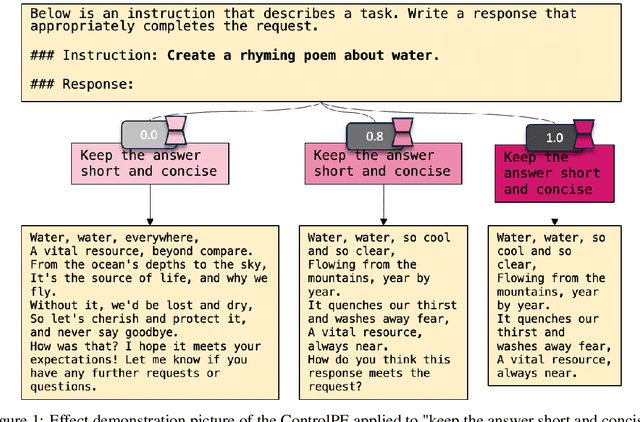
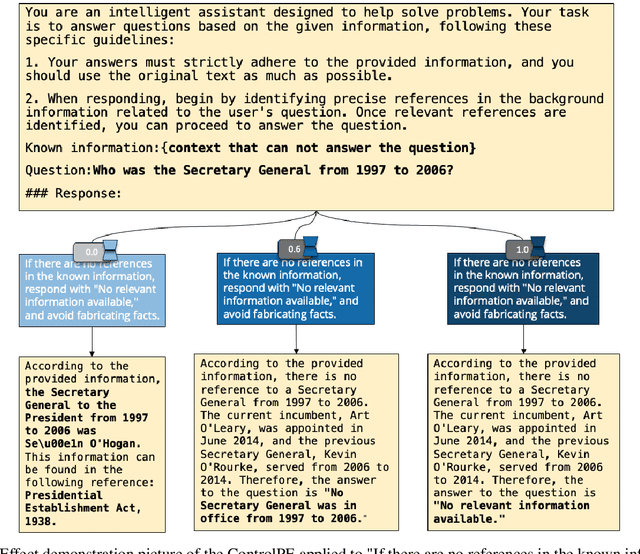
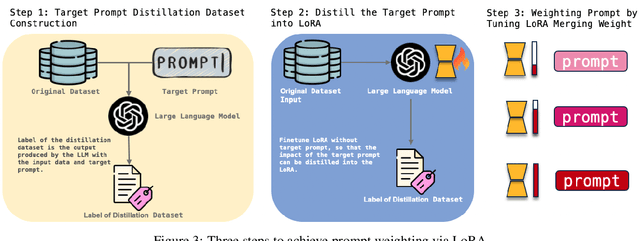
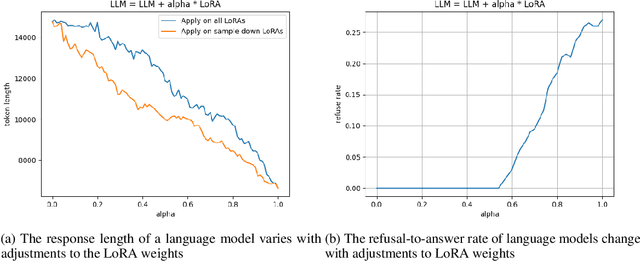
Abstract:As the use of large language models becomes more widespread, techniques like parameter-efficient fine-tuning and other methods for controlled generation are gaining traction for customizing models and managing their outputs. However, the challenge of precisely controlling how prompts influence these models is an area ripe for further investigation. In response, we introduce ControlPE (Continuously Controllable Prompt Engineering). ControlPE enables finer adjustments to prompt effects, complementing existing prompt engineering, and effectively controls continuous targets. This approach harnesses the power of LoRA (Low-Rank Adaptation) to create an effect akin to prompt weighting, enabling fine-tuned adjustments to the impact of prompts. Our methodology involves generating specialized datasets for prompt distillation, incorporating these prompts into the LoRA model, and carefully adjusting LoRA merging weight to regulate the influence of prompts. This provides a dynamic and adaptable tool for prompt control. Through our experiments, we have validated the practicality and efficacy of ControlPE. It proves to be a promising solution for control a variety of prompts, ranging from generating short responses prompts, refusal prompts to chain-of-thought prompts.
 Add to Chrome
Add to Chrome Add to Firefox
Add to Firefox Add to Edge
Add to Edge